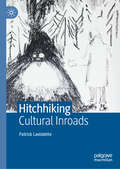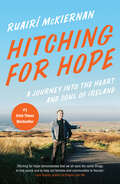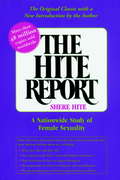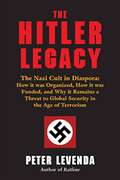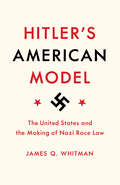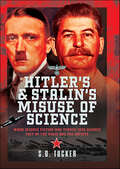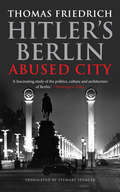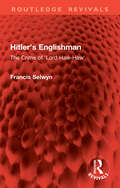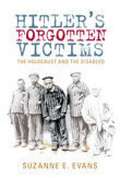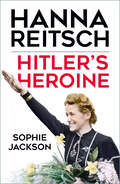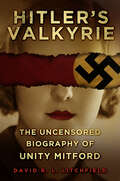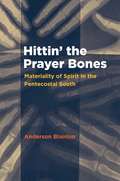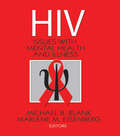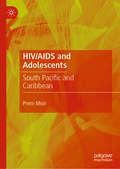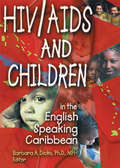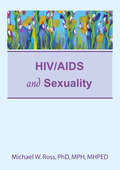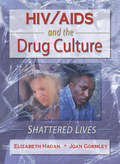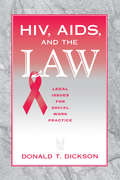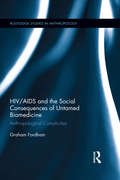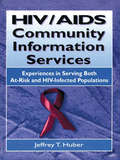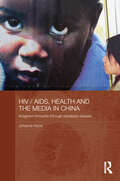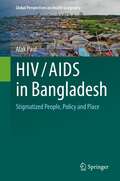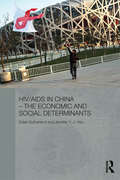- Table View
- List View
Hitchhiking: Cultural Inroads
by Patrick LavioletteThe first English-language social science book to comprehensively explore hitchhiking in the contemporary era in the West, this volume covers a lot of ground—it goes to and fro, in an echo of the modus operandi of most hitchhiking journeys. As scarification, piercings, and tattoos move from the counter-culture to popular culture, hitchhiking has remained an activity apart. Yet, with the assistance of virtual platforms and through its ever-growing memorialisation in literature and the arts, hitchhiking persists into the 21st century, despite the many social anxieties surrounding it. The themes addressed here thus include: adventure; gender; fear and trust; freedom and existential travel; road and transport infrastructures; communities of protest and resistance; civic surveillance and risk ecologies.
Hitching for Hope: A Journey into the Heart and Soul of Ireland
by null Ruairi Mckiernan#1 Irish Times Bestseller!A modern travel tale—part personal pilgrimage, part political quest—that captures the power of human resilience"McKiernan sticks his thumb out, and somehow a healthy dose of humanity manages to roll up alongside him. . . . This book is a paean to nuance, decency and possibility."—Colum McCann, National Book Award winner and New York Times bestselling author of Let the Great World Spin and Apeirogon. Following the collapse of Ireland’s Celtic Tiger economy, social activist Ruairí McKiernan questions whether he should join the mounting number of emigrants searching for greater opportunity elsewhere. McKiernan embarks on a hitchhiking odyssey with no money, no itinerary and no idea where he might end up each night. His mission: to give voice to those emerging from one of the most painful periods of economic and social turmoil in Ireland’s history. Engaging, provocative and sincere, Hitching for Hope is a testimony to the spirit of Ireland. It is an inspirational manifesto for hope and healing in troubled times.
Hitching for Hope: A Journey into the Heart and Soul of Ireland
by Ruairí McKiernanA modern travel tale—part personal pilgrimage, part political quest—that captures the power of human resilience <P><P> "McKiernan sticks his thumb out, and somehow a healthy dose of humanity manages to roll up alongside him. . . . This book is a paean to nuance, decency and possibility."—Colum McCann, National Book Award winner and New York Times bestselling author of Let the Great World Spin and Apeirogon. <P><P> Following the collapse of Ireland’s Celtic Tiger economy, social activist Ruairí McKiernan questions whether he should join the mounting number of emigrants searching for greater opportunity elsewhere. McKiernan embarks on a hitchhiking odyssey with no money, no itinerary and no idea where he might end up each night. His mission: to give voice to those emerging from one of the most painful periods of economic and social turmoil in Ireland’s history. Engaging, provocative and sincere, Hitching for Hope is a testimony to the spirit of Ireland. It is an inspirational manifesto for hope and healing in troubled times.
The Hite Report: A Nationwide Study of Female Sexuality
by Shere HiteA reproduction of the classic text, unavailable now for more than a decade, with a new introduction by the author. The Hite Report, first published in 1976, was a sexual revolution in six hundred pages. To answer sensitive questions dealing with the most intimate details of women's sexuality, Hite's innovation was simple: she asked women, a lot of them, everything--and published the results.One hundred thousand women, ages fourteen to seventy-eight, were asked what they do and don't like about sex; how orgasm really feels, with and without intercourse; how it feels not to have an orgasm during sex; the importance of clitoral stimulation and masturbation; and to name the greatest pleasures and frustrations of their sexual lives, among many other questions.The Hite Report declares that orgasm is easy and strong for women, given the right stimulation; that most women have orgasm most easily during masturbation or clitoral stimulation by hand; that sex as we define it is a cultural institution, not a biological one; and that attitudes must change to include the stimulation women desire.
Hitler: 1889-1936 Hubris
by Ian KershawThis is a biography of Hitler from birth to 1936, and his creation of The Third Reich, i.e., Nazi Germany.
The Hitler Legacy: The Nazi Cult In Diaspora: How It Was Organized, How It Was Funded, And Why It Remains A Threat To Global Security In The Age Of Terrorism
by Peter LevendaMore than thirty years after his first investigation of the Nazi underground Peter Levenda has returned again and again to his quest for the truth about the true character of the Nazi cult and the people and political movements it has influenced in the decades since the end of World War II. The wide sweep of this investigation moves from a Ku Klux Klan headquarters in Reading, Pennsylvania to the New York City office of the Palestine Liberation Organization; from the apartment of a notorious neo-Nazi leader to an Islamic boarding school—headquarters of the man who ordered the Bali Bombings. When Levenda uncovered the existence of a Nazi underworld in Asia, the nexus of religion, politics, terrorism and occult beliefs was revealed to be the real domain of the threat to global security. Meticulously researched—from both archival material and declassified intelligence agency files, to personal interviews and investigations undertaken in Asia, Europe and Latin America—The Hitler Legacy is the story of how the mistakes of the 20th century have come home to roost in the 21st. This book will challenge the conventional thinking about such subjects as the Muslim Brotherhood and Islamist terrorism and even about the alleged death of one of history's most infamous killers—Adolf Hitler.
Hitler's American Model: The United States and the Making of Nazi Race Law
by James Q. WhitmanNazism triumphed in Germany during the high era of Jim Crow laws in the United States. Did the American regime of racial oppression in any way inspire the Nazis? The unsettling answer is yes. In Hitler's American Model, James Whitman presents a detailed investigation of the American impact on the notorious Nuremberg Laws, the centerpiece anti-Jewish legislation of the Nazi regime. Contrary to those who have insisted that there was no meaningful connection between American and German racial repression, Whitman demonstrates that the Nazis took a real, sustained, significant, and revealing interest in American race policies.As Whitman shows, the Nuremberg Laws were crafted in an atmosphere of considerable attention to the precedents American race laws had to offer. German praise for American practices, already found in Hitler's Mein Kampf, was continuous throughout the early 1930s, and the most radical Nazi lawyers were eager advocates of the use of American models. But while Jim Crow segregation was one aspect of American law that appealed to Nazi radicals, it was not the most consequential one. Rather, both American citizenship and antimiscegenation laws proved directly relevant to the two principal Nuremberg Laws—the Citizenship Law and the Blood Law. Whitman looks at the ultimate, ugly irony that when Nazis rejected American practices, it was sometimes not because they found them too enlightened, but too harsh.Indelibly linking American race laws to the shaping of Nazi policies in Germany, Hitler's American Model upends understandings of America's influence on racist practices in the wider world.
Hitler's and Stalin's Misuse of Science: When Science Fiction was Turned into Science Fact by the Nazis and the Soviets
by S. D. TuckerS.D. Tucker delves into the Nazi and Soviet historical hijacking of science by extreme ideologies, revealing the dangerous consequences of pseudoscientific narratives in today's world. In today’s world, science itself, which we are constantly being told is a neutral vehicle for wholly objective ideas and theories, is increasingly being hijacked and abused by the toxic modern cult of identity politics, of both left and right. But should we be too surprised by any of this? No, because this exact same sorry process has happened time and again before, under the rule of totalitarian political cults like the Nazis and the Soviets, both of which vigorously promoted various pseudoscientific theories of ‘Aryan Science’ and ‘Marxist Science’ on the sole grounds that they were ideologically correct as opposed to being factually so. Nazi racial pseudoscience and belief in nonsense like the ‘World Ice Theory’, which claimed that stars did not really exist and were actually just reflections of the sun off giant floating space-icebergs, were widely encouraged in the Third Reich, and used for long-term military weather-forecasting purposes. Likewise, the ideas of the renegade biologist Trofim Lysenko, who developed a deluded ‘anti-capitalist’ theory of genetics opposed to Darwin’s, were responsible for widespread famine in the USSR when Stalin allowed him to apply them practically towards the nation’s crop-harvests. Those academics and functionaries who disputed these clearly false pseudoscientific notions often found themselves in deep trouble – or, ultimately, dead. In this incisive and challenging study, author S.D. Tucker explores the often weird and fanciful theories that were proposed and took hold under these extreme regimes – and in doing so sends a word of warning to the modern world of the internet and social media where similar bizarre ideas are expounded and consumed with frightening gullibility. Everywhere from Western universities, schools and hospitals to Vladimir Putin’s Russia, absurd stories of sexist glaciers, racist gravity, socialist trees and NATO-backed mutant extra-terrestrial potatoes are being promoted as items of politically mandated scientific fact by compliant collaborators and credulous social media followers. Pseudoscientific narratives are even now used to justify the 2022 invasion of Ukraine, much as they were once used to justify the Nazi conquest of Europe or the spread of Communist revolution across the globe.
Hitler's Berlin
by Stewart SpencerFrom his first visit to Berlin in 1916, Hitler was preoccupied and fascinated by Germany's great capital city. In this vivid and entirely new account of Hitler's relationship with Berlin, Thomas Friedrich explores how Hitler identified with the city, how his political aspirations were reflected in architectural aspirations for the capital, and how Berlin surprisingly influenced the development of Hitler's political ideas. A leading expert on the twentieth-century history of Berlin, Friedrich employs new and little-known German sources to track Hitler's attitudes and plans for the city. Even while he despised both the cosmopolitan culture of the Weimar Republic and the profound Jewish influence on the city, Hitler was drawn to the grandiosity of its architecture and its imperial spirit. He dreamed of transforming Berlin into a capital that would reflect his autocracy, and he used the city for such varied purposes as testing his anti-Semitic policies and demonstrating the might of the Third Reich. Illuminating Berlin's burdened years under Nazi subjection, Friedrich offers new understandings of Hitler and his politics, architectural views, and artistic opinions.
Hitler's Englishman: The Crime of 'Lord Haw-Haw' (Routledge Revivals)
by Francis Selwyn‘Lord Haw-Haw’ (William Joyce) was Hitler’s secret weapon of the airwaves. Nightly through the Second World War Joyce’s nasal tones were transmitted to a delighted if sceptical audience. He had a large and enthusiastic following, who looked upon his catchphrase ‘Jairmany calling’ as the promise of comic relief as sure as that provided by Tommy Handley and the much-loved radio programme It’s That Man Again (ITMA).Joyce, of course, was not a figure of fun; nor was he regarded as one by the British government which twisted and adjusted the law to bring him to a traitor’s death in 1946. Originally published in 1987, in this new approach to the case of William Joyce, Francis Selwyn looks both at the career of Joyce, the Irish-American-cum-Fascist bully-boy, and the changing nature of treason, altered by the events of the Second World War.Was Joyce a traitor? Or was he sent to the scaffold as a necessary sacrifice? Behind the voice of the decadent aristocrat lurked the real William Joyce, a street-corner fanatic of the Fascist movement. Who was he? Hitler’s Englishman follows the path to Nazi treason and the final reckoning on the gallows of Wandsworth Prison.Treason, as Francis Selwyn shows, is a crime which has been adapted to circumstances. After the Second Word War it was reshaped to embrace ‘new’ traitors, who had committed different kinds of treason. For Joyce, his loyalty to the ideals of Nazism transcended territory and nationality: he had no regrets about what he had done. His story, and the story of treason in the days of victory over Fascism, still have a powerful message for us today.
Hitler's Forgotten Victims: The Holocaust and the Disabled
by Suzanne EvansBetween 1939 and 1945, the Nazi regime systematically murdered hundreds of thousands of children and adults with disabilities as part of its 'euthanasia' policy. These programs were designed to eliminate all persons with disabilities who, according to Nazi ideology, threatened the health and purity of the German race. Hitler's Forgotten Victims explores the development and workings of this nightmarish process, a relatively neglected aspect of the Holocaust. Suzanne Evans's account draws on the rich historical record as well as scores of exclusive interviews with disabled Holocaust survivors. It begins with a description of the Nazis' Children's Killing Program, in which tens of thousands of children with mental and physical disabilities were murdered by their physicians, usually by starvation or lethal injection. The book goes on to recount the T4 euthanasia program, in which adults with disabilities were disposed of in six official centers, and the development of the Sterilization Law that allowed the forced sterilization of at least a half-million young adults with disabilities.
Hitler's Heroine: Hanna Reitsch
by Sophie JacksonHanna Reitsch longed to fly. Having broken records and earned the respect of the Nazi regime, she was the first female Luftwaffe test pilot, and eventually became Adolf Hitler’s personal heroine.An ardent Nazi, Hanna was prepared to die for the cause, first as a test pilot for the dangerous V1 flying bombs and later by volunteering for a suggested Nazi ‘kamikaze’ squadron. After her capture she complained bitterly of not being able to die with her leader, but she went on to have a celebrated post-war flying career. She died at the age of 67, creating a new mystery – did Hanna kill herself using the cyanide pill Hitler had given her over thirty years earlier? Hitler’s Heroine reveals new facts about the mysterious pilot and cuts through the many myths that have surrounded her life and death, bringing this fascinating woman back to life for the twenty-first century.
Hitler's Valkyrie: The Uncensored Biography of Unity Mitford
by David R L. LitchfieldEmerging from modern history as a remarkable and much-loved family, the Mitfords have remained largely unrepentant concerning theirs and particularly Unity’s enthusiastic support of Hitler, the Nazis, Oswald Mosley and British fascism. However, having initially encouraged and supported Unity’s affair with Hitler, they subsequently insisted that she had in fact been a rather unintelligent, clumsy lump of a girl, whose virginal relationship with one of the most terrifying dictators of all time was a mere unrequited romantic obsession. As this book will show, nothing could be further from the truth. Following further research and reexamination of the family’s, friends’ and journalists’ often contradictory evidence, plus new information supplied by the author’s own family and friends, Hitler’s Valkyrie will reveal that while Unity was, like Hitler, an extreme fantasist, there was very little of the juvenile romantic about her. On the contrary, she was highly intelligent, free-spirited and athletic. She was also the only Englishwoman who came close to being capable of changing the course of the Second World War. Here David R.L. Litchfield untangles the decades-old web of intrigue surrounding Unity Mitford and one of the most dangerous men of all time, creating a fascinating book of unparalleled importance to the Mitford legacy.
Hittin' the Prayer Bones
by Anderson BlantonIn this work, Anderson Blanton illuminates how prayer, faith, and healing are intertwined with technologies of sound reproduction and material culture in the charismatic Christian worship of southern Appalachia. From the radios used to broadcast prayer to the curative faith cloths circulated through the postal system, material objects known as spirit-matter have become essential since the 1940s, Blanton argues, to the Pentecostal community's understanding and performances of faith. Hittin' the Prayer Bones draws on Blanton's extensive site visits with church congregations, radio preachers and their listeners inside and outside the broadcasting studios, and more than thirty years of recorded charismatic worship made available to him by a small Christian radio station. In documenting the transformation and consecration of everyday objects through performances of communal worship, healing prayer, and chanted preaching, Blanton frames his ethnographic research in the historiography of faith healing and prayer, as well as theoretical models of materiality and transcendence. At the same time, his work affectingly conveys the feelings of horror, healing, and humor that are unleashed in practitioners as they experience, in their own words, the sacred, healing presence of the Holy Ghost.
Hiv: Issues with Mental Health and Illness
by Michael B. Blank Marlene M. EisenbergLearn why it&’s time for a new era in mental health and prevention scienceHIV: Issues with Mental Health and Illness is a comprehensive examination of the co-morbidity that exists between HIV/AIDS and mental illness. Internationally recognized experts in the field analyze the latest research on why HIV sufferers are at risk of developing mental illness and how people who suffer from mental illness risk contracting HIV through sexual behavior and substance abuse. This unique book focuses on clinical and diagnostic issues, the organization of service delivery systems, and community-based interventions.HIV: Issues with Mental Health and Illness presents vital contributions from physicians, sociologists, nurses, social workers, and psychologists working to develop a plan to reduce the number of persons affected by the epidemic, and to improve the quality of life of those already HIV infected. Aimed at promoting a new era in mental health and prevention science, the book examines vital issues including: the interplay between depression, HIV, and chronic fatigue; condom use among adolescents with psychiatric disorders; predicting HIV risk and how targeted intervention can address multiple health risks; how an increase in emotional stress can affect African-American women concerned about becoming HIV infected; STI risk reduction strategies; how client gender can affect mental health care service delivery; and the implementation of intervention programs as part of supported housing programs.HIV: Issues with Mental Health and Illness examines: bridging the gap between research and practice depression and HIV schizophrenia and HIV mental health policy and infectious diseases HIV prevention community-based participatory research community psychology mental health disparities translation research transforming public health systemsHIV: Issues with Mental Health and Illness is an invaluable resource for public health workers and policymakers, psychologists, psychiatrists, social work nurses, infectious disease physicians, and addictions disease counselors.
HIV/AIDS and Adolescents: South Pacific and Caribbean
by Prem MisirThis book addresses the relationship between high school students’ HIV and AIDS knowledge and their stigma-related attitudes/perceptions of people living with HIV (PLHIV) in the Caribbean and South Pacific, with a view to designing effective stigma-reduction combined intervention programs. Presenting an international cross-sectional study using a purposive sample of high school students from Fiji (South Pacific), Vanuatu (South Pacific), Guyana, and Antigua & Barbuda (Caribbean) to assess HIV and AIDS knowledge and stigma-related attitudes by gender, age, religion, race/ethnicity, and socioeconomic status, the book shows how stigmatizing attitudes and beliefs negatively impact interventions to prevent and treat HIV and AIDS.
HIV/AIDS and Children in the English Speaking Caribbean
by Barbara A DicksExamine the biopsychosocial, environmental, spiritual, and policy issues that affect HIV/AIDS prevention/service delivery issues for Caribbean youth!This groundbreaking book provides an overview and informed discussion of HIV/AIDS as it affects children and adolescents in Antigua, Barbados, Grenada, Jamaica, and The Republic of Trinidad and Tobago. With contributions from noted HIV/AIDS experts in the region, it examines the biopsychosocial, environmental, spiritual, and policy issues that impact HIV/AIDS prevention/service delivery issues for Caribbean youth. HIV/AIDS and Children in the English Speaking Caribbean breaks the silence on this subject that has existed throughout the Caribbean--second only to Sub-Saharan Africa in terms of the number of people infected with the disease--by focusing attention on the issues, needs, perspectives, policies, and research that impact those affected by the epidemic in that region. This unique book gives special attention to the distinctive differences among Caribbean countries with varying customs based on colonial influences including language, culture, traditions, and religion. User-friendly tables and figures make the statistical information easy to understand.HIV/AIDS and Children in the English Speaking Caribbean discusses a diversity of topics, including: psycho-cultural issues and adolescents the impact of dance hall music on HIV and adolescents school programs evaluation of residential placements for children with AIDS sexual risk-taking behaviors of Jamaican street boys the inaugural lecture on AIDS at the University of the West Indies . . . and much more. Everyone whose professional life brings them into contact with this population, including social workers, psychologists, counselors, clinicians, nurses and other health care professionals, as well as educators and their students will find HIV/AIDS and Children in the English Speaking Caribbean a very useful resource for understanding the devastating impact of the HIV/AIDS virus on children and adolescents in that part of the world.
HIV/AIDS and Sexuality
by Michael W RossIn this important book, editor Michael Ross brings together the latest knowledge and research concerning the relationship between HIV and AIDS and sexual functioning. HIV/AIDS and Sexuality explores the experiences of being HIV-infected and the impact of infection on an individual's sexuality. It describes differences that may be associated with individuals who are infected or concerned about infection, and it provides new in-depth analyses of the effect of HIV on sexuality and sexual risks. The book provides clinical perspectives on sexual problems associated with HIV infection as well as some treatment approaches. Contributing authors represent the United States, Australia, and Europe and discuss heterosexual men and women, gay men, lesbians, and injecting drug users. This diversity provides a more complete picture of the experiences of people with HIV in terms of explicit and implicit sexuality. Chapters include cross-sectional and cohort study designs as well as qualitative, quantitative, and clinical approaches. Some of the topics explored are:the centrality of sexuality to equality of life and identity and the impact of HIV on sexuality in gay-identified menthe psychological impact of making changes in sexual behavior on gay men with HIV infectionrisk behaviors in seropositive and seronegative womena study of a cohort of HIV-infected women associated with the militarysexual addiction in gay men and its association with HIV risksovert and subtle communications processes that occur between health care providers and clients about sexuality and HIVstages of change in safer sexual practices in a cohort of gay menpersonality variables associated with risk and infection in both homosexual and heterosexual menHIV/AIDS and Sexuality opens up the area of sexuality in people living with HIV and focuses much-needed attention on the issues involved in sexual expression, HIV transmission risk, and living with HIV infection. This book is an illuminating exploration into the subject that helps professionals better understand their clients and thus provide more compassionate and effective care.
HIV/AIDS and the Drug Culture: Shattered Lives
by Joan Gormley Elizabeth HaganIn this startling new collection of case studies entitled HIV/AIDS and the Drug Culture: Shattered Lives, you‘ll take an eye-opening and informative look at the lifestyle and culture of the HIV/AIDS intravenous drug users (IVDUs). You‘ll see how health care providers and caregivers can update their methods and mindsets in order to meet the needs of
HIV, AIDS, and the Law: Legal Issues for Social Work Practice and Policy
by Donald DicksonAlthough morbidity among HIV/AIDS victims has decreased, the rate of new infections has remained steady for several years, substantially increasing the likelihood that this epidemic will continue and expand as a concern for social workers and their clientele, both of whom will need to be kept informed of the complex laws governing the milieu and the consequences of the disease. This is certainly the case with its spread throughout Asia and Africa. In this new work, the author draws upon statutes and court decisions from across the United States to provide a comprehensive and current picture of the many facets of HIV/AIDS law, including health policy; confidentiality; privacy; bioethics; the workplace; and criminal law and corrections. The volume of legal, medical, social science, and popular literature pertaining to HIV/AIDS that has been published over the past two decades is staggering. Hence, any addition to this collection needs some justification. What Dickson offers is different from what has preceded. Rather than one more contribution to the extensive legal or social science literature, this book attempts to integrate the perspectives from two fields: law and social work. The hope is that this will give social workers, practitioners, and teachers a better understanding of one of the major issues that may face them in their work with patients and clients every day.To date, although there is extensive HIV and AIDS-related literature in social work and the social sciences, it is primarily focused on social work practice issues. Where law has been introduced in these works, it often is narrow in focus and, given the rapid changes in the field, no longer up to date. This book does not purport to discuss all legal issues in all jurisdictions relating to HIV/AIDS, but rather to choose selectively those that have particular relevance for social work and social policy. The author has placed reliance on those published medical works cited with approval in the legal and
HIV/AIDS and the Social Consequences of Untamed Biomedicine: Anthropological Complicities (Routledge Studies in Anthropology #18)
by Graham FordhamDrawing on the case of HIV/AIDS in Thailand, this book examines how anthropological and other interpretative social science research has been utilized in modeling the AIDS epidemic, and in the design and implementation of interventions. It argues that much social science research has been complicit with the forces that generated the epidemic and with the social control agendas of the state, and that as such it has increased the weight of structural violence bearing upon the afflicted. The book also questions claims of Thai AIDS control success, arguing that these can only be made at the cost of excluding categories such as intravenous drug users, the incarcerated, and homosexuals, who continue to experience extraordinarily high levels of levels of HIV infection. Considered deviant and undeserving, these persons have deliberately been excluded from harm reduction programs. Overall, this work argues for the untapped potential of anthropological research in the health field, a confident anthropology rooted in ethnography and a critical reflexivity. Crucially, it argues that in context of interdisciplinary collaborations, anthropological research must refuse relegation to the status of an adjunct discipline, and must be free epistemologically and methodologically from the universalizing assumptions and practices of biomedicine.
HIV/AIDS Community Information Services: Experiences in Serving Both At-Risk and HIV-Infected Populations
by M Sandra Wood Jeffrey T HuberInformation forms the basis for education, and currently education is the only weapon available to stem the spread of HIV/AIDS and to foster empathy toward individuals already affected by the disease. HIV/AIDS and Community Information Services provides readers with insight into the information construct within the AIDS arena and how that construct affects the provision of information services to the HIV/AIDS affected population. It will serve as an irreplaceable reference as the number of individuals with AIDS increases, creating a greater demand for information and making that information increasingly difficult to provide.While directories exist to assist with practical approaches to accessing HIV/AIDS-related information, none had served as a comprehensive resource concerning the nature of that information or the provision of information services. HIV/AIDS Community Information Services fills that void. It fosters the enlightenment of the general public concerning the true nature of HIV/AIDS, guides readers in providing information services--both educational and recreational--to individuals affected by HIV/AIDS, and encourages the dissemination of instructional materials to those individuals at risk for infection. In doing so, contributors provide readers with information about: the relationship between AIDS and the body of information concerning the disease the complex nature of HIV/AIDS-related information available HIV/AIDS information services information as a means for empowerment suggestions for future programs, potential collaboration efforts, and innovative servicesAn essential guide for information professionals, librarians, health educators, counselors, members of community-based AIDS service organizations, and individuals affected by HIV/AIDS, HIV/AIDS Community Information Services foster the creation, accession, collection, organization, dissemination, and sharing of information concerning the HIV/AIDS epidemic and promotes the provision of services to individuals already affected by HIV/AIDS.
HIV / AIDS, Health and the Media in China: Imagined Immunity Through Racialized Disease (Media, Culture And Social Change In Asia Ser. #23)
by Johanna HoodHIV/AIDS is an increasingly serious problem in China, with an increasing number of new cases every year. As a result, HIV organizations have boomed, with both state and non-governmental organisations responding to the threat with campaigns to increase public awareness of the disease, utilising the media as the primary tool to reshape citizens’ understandings and views of HIV/AIDS. This book explores how HIV/AIDS is portrayed in China’s media. It argues that, despite increasing education campaigns, media coverage and social and academic openness towards HIV/AIDS, many Chinese of the majority Han ethnic group regard infection as a distant possibility, believing themselves to be immune and infection a problem only for certain non-Han ethnic groups with perceived lower moral standards, in particular black Africans. The book explores how HIV/AIDS is reported, analysing the language used in constructing and encoding the health narrative, its subjects, and ideas about the disease. It demonstrates how China’s media frequently employs negative events to present the most extreme possibilities of poverty, danger, disasters and disease, with black Africa portrayed as an antiquated, distant and socioculturally and politically backward place, uniquely unsuitable for the containment of disease, in contrast with the progressive, scientifically sophisticated and morally upstanding Chinese. It argues that this discourse has had the effect of distancing many Chinese from the perceived possibility of infection, thus compromising the effectiveness of public health campaigns on HIV/AIDs. It suggests that the key to combating the spread of the disease lies in challenging the racialised narratives through which the disease is portrayed in China’s media, rather than simply by aiming to educate greater numbers of people.
HIV/AIDS in Bangladesh: Stigmatized People, Policy and Place (Global Perspectives on Health Geography)
by Alak PaulThis book aims to show the conditions and behaviors of vulnerable and marginalized people in Bangladesh which put them at risk of HIV/AIDS infection, and what their adopted coping strategies are and how these play out. In addition, the book seeks to gain an understanding of the perceptions of civil society and policy planners with respect to vulnerability to HIV, and the necessary mitigation measures. While there is much published literature on the epidemiology and etiology for the most at-risk groups in the region, there has not yet been any in-depth research concerning the socio-cultural and geographic impacts of HIV issues in Bangladesh. Almost all of the literature shows HIV as an epidemiological problem rather than investigating it from a social or cultural point of view, and still less using qualitative methods. The present work is an endeavor to fill these gaps by providing valuable qualitative field data to demonstrate the causes of HIV risk and vulnerability, and to examine the nature of the social and locational context of HIV/AIDS in Bangladesh and to assist with health care policy planning. The book will be of use to students and researchers, studying public health, health geography, medical sociology, medical anthropology, social psychology and social epidemiology, and to professionals in the fields of development, community medicine, health management and social policy.
HIV/AIDS in China - The Economic and Social Determinants: The Economic And Social Determinants (Routledge Contemporary China Series)
by Dylan Sutherland Jennifer Y.J. HsuSouth and East Asia may well become the epicentres of the global HIV/AIDS pandemic. More than three-quarters of a million people are now estimated to be living with HIV/AIDS in China. In 2009, AIDS had already become the leading cause of death by infectious disease. Yet, even despite China’s recent economic and social progress, a number of development issues - not least the emergence of glaring inequalities - have also emerged. The expansion of the HIV/AIDS epidemic is also an important longer term development challenge. This book analyses China’s HIV/AIDS epidemic, with particular attention to the nature and impact of current economic and social changes and how these changes may be driving the epidemic. It examines aspects of income and gender inequality; rural-urban migration; commercial sex work; healthcare and civil society organizations. Health care reforms and the role of NGOs are also considered as well as general government policy. Overall, this book provides a full discussion of the most critical aspects of the current HIV/AIDS situation in China and its impact on Chinese society.
